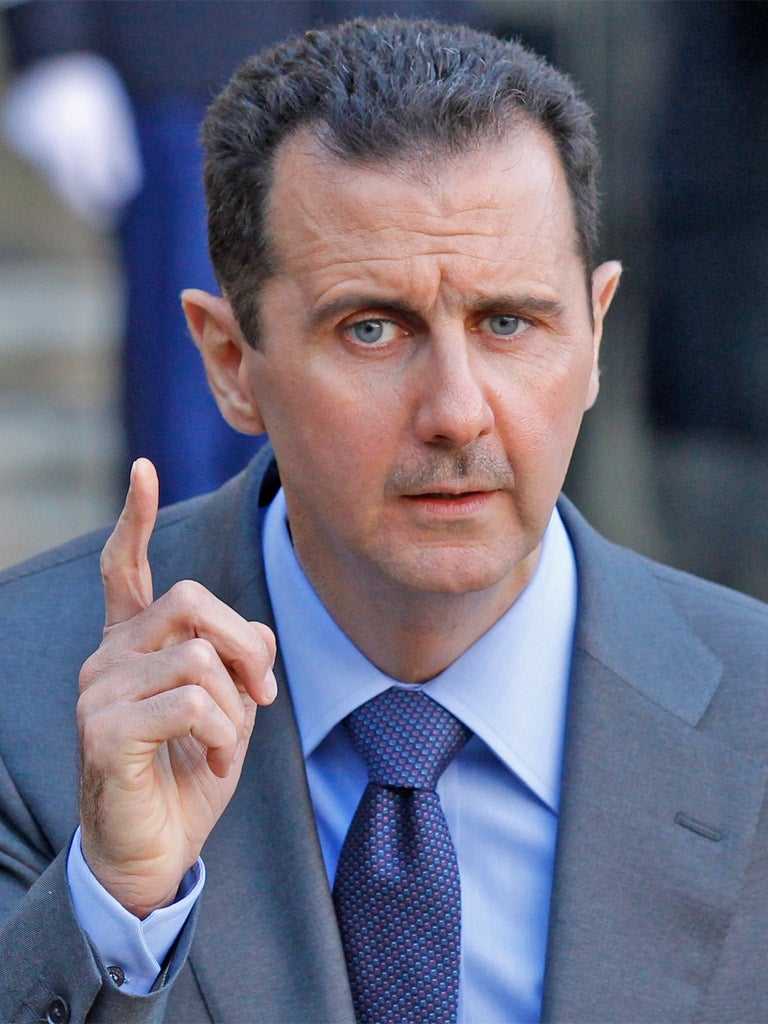Stalemate at UN on resolution urging Assad to go

A defiant Russia resisted intense pressure from the West and several Arab countries yesterday for a strong United Nations resolution demanding President Bashar al-Assad steps aside to end the political violence in Syria and speed a transition to democracy.
The Foreign Secretary, William Hague, the US Secretary of State, Hillary Clinton, Alain Juppé, the French Foreign Minister and several Arab ministers were in New York for a Security Council meeting as fighting between government troops and regime opponents worsened.
However, as negotiations on the final text continued, there was no sign that Moscow, Syria's most important ally, would consent to any wording that called on Mr Assad to go or that authorised military action.
The draft resolution, which stipulates the Council discusses "further measures" if the Syrian leader does not comply within 15 days, was "a path to civil war", Gennady Gatilov, the Russian Deputy Foreign Minister, said.
At least 10 of the 15 Security Council members were supportive of demanding President Assad's departure, with China, India, Pakistan and South Africa broadly opposed. But, diplomats said, the critical country was Russia, which has made clear it would veto any resolution it believed went too far.
Moscow's stubbornness reflects the determination of Prime Minister Vladimir Putin to reassert Russia's role on the global stage, after it allowed last March's UN resolution authorising the US and its allies to impose a no-fly zone over Libya, ultimately enabling the overthrow of Colonel Muammar Gaddafi.
Some countries were "obsessed" by regime change in the Middle East, Sergei Lavrov, Russia's Foreign Minister, said. He warned that "we are going to witness a very bad situation, much, much broader than just Syria, Libya or Egypt or any other single country" if that persisted.
The best hopes of a Security Council deal that would avoid a Russian veto lie with the plan drawn up by the Arab League, which froze its monitoring mission in Syria at the weekend because of the continuing violence.
Yesterday, Nabil al-Arab, the Arab League's chief, and Hamad bin Jassim al-Thani, the Prime Minister of Qatar, briefed the Council on the proposals, which call for President Assad to hand power to his vice-president, and the formation of a national unity government to prepare democratic elections. "This is not the West telling Syria what to do," Mr Hague said. "This is the Arab world calling on the UN Security Council to help address the crisis in Syria."
As diplomats wrangled in New York, President Assad's forces seemed to be making some progress on the ground, regaining control of some Damascus suburbs after three days of fighting. But fierce clashes continued in other Syrian cities. More than 100 people, including 40 civilians, were killed on Monday, and at least 20 more yesterday, Syrian activists claimed. According to the UN, more than 5,000 people have died in 10 months of unrest.
Russian ally: Why Moscow cares
Military ties: The Syrian port of Tartus is home to Russia's only military base outside the former USSR, servicing navy ships. Russia's arms contracts with Syria total $4bn, including a $550m deal to sell fighter jets signed last month.
Energy: The Russian engineering company Stroytransgaz is constructing a natural gas processing plant about 125 miles east of Homs. Russian investments in Syria encompassing infrastructure, energy and tourism total $20bn.
Historic relationship: The friendship is deep-seated. It was Soviet assistance that helped build the strength of the ruling Baath party, with which it shared some socialist ideologies. Bashar's father, Hafez, trained as an air force pilot in the Soviet Union.
Join our commenting forum
Join thought-provoking conversations, follow other Independent readers and see their replies
Comments
Bookmark popover
Removed from bookmarks